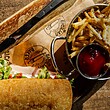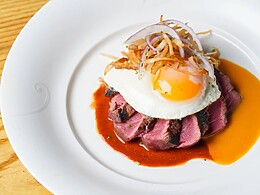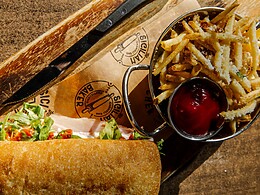We’ve asked some of our favorite docs around town for their weekly grocery list to make sure we’re stocking our fridge and pantry the same way as the healthcare pros. First up, Dr. Laura Glenn, NMD, a naturopathic physician at Rejuvena Health & Aesthetics, shares her grocery-list staples.
Some type of cruciferous vegetable, like brussels sprouts, cauliflower, cabbage, broccoli and kale. They contain numerous compounds that are linked to lower cancer risks. Many also rich in calcium and other minerals.
Unsweetened oatmeal. Oatmeal is a quick breakfast to prepare and regular consumption of oats can help decrease total and LDL cholesterol. They are rich in fiber and antioxidants.
Blueberries. They are rich in flavonoids and other antioxidants beneficial for overall health. They contain vitamin C, which can help with collagen production and skin health.
Protein powder. Many women tend to under-eat protein, which can negatively affect calcium metabolism and bone health in premenopausal women. I like having a protein powder on hand to mix in to my oatmeal in the morning or mix in to a fruit smoothie for breakfast, to ensure that I am consuming my daily protein requirements.
Some type of probiotic-rich food. Yogurt with live cultures, lacto-fermented pickles or sauerkraut, and kombucha tea are all great choices. Research is constantly developing on the importance of the microbiome and the impact on our health. Keeping a healthy population of good bacteria in the gut has been associated with improved immune function, reduced incidence of asthma and allergy, and better GI health.
Organic coffee. Like many people, I love my coffee. It is a good source of antioxidants, but conventionally produced coffee is heavily chemically treated with pesticides. Organic coffee is a much better choice for reducing pesticide exposure.
Free-range eggs. Chickens that free range are able to eat a more varied diet that increases the omega-3 content of their eggs. Omega-3 fatty acids are important for preventing heart disease and reducing inflammation.
Wild-caught Pacific salmon. I prefer wild salmon as they are higher in caroteinoids and minerals due to their diet, and while both are a good source of omega-3 fats, farmed salmon is higher in undesirable saturated fats.
Green tea. Green tea is rich in antioxidants, including EGCG, which is thought to reduce inflammation, protect against certain cancers, and promote good heart health. It also contains l-theanine, which is an amino acid that has a calming and relaxing effect on the body.
Frozen vegetables. Flash-frozen vegetables have just as much nutritional value as fresh produce, and are very convenient to have on hand for easy meal preparation. It’s important to get a variety of vegetables in the diet, so keeping several different kinds of veggies on hand and rotating through your meal planning can keep things interesting as well as providing a greater variety of vitamins, minerals, and antioxidants.











